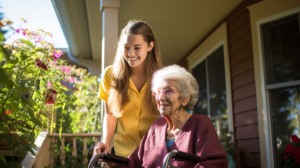
Assisted living can be beneficial to the Long Term Care of Aging Parkinson’s Patients
Parkinson’s disease is devastating for many individuals and families. Yet, the people often diagnosed with it find ways to cope as best they can. Their families certainly step up to provide the best level of care and support that they can, but eventually, as the disease progresses and their support system ages, it might be more difficult to provide adequate care over time.
Elder care becomes essential for somebody with Parkinson’s in their golden years of life. It doesn’t matter whether they have a strong family support system or not; the symptoms of Parkinson’s become more pronounced. It becomes increasingly difficult to do those Activities of Daily Living (ADLs) that most other Americans take for granted.
Assisted living is arguably one of the best elder care options available for aging men and women who may need some level of support and assistance. Why would this be best for somebody with Parkinson’s? Let’s consider a few reasons now.
1. They would be surrounded by experienced staff.
Depending on the facility, the staff may very well be experienced in helping those with Parkinson’s and other related conditions. They would most likely have acute insight into the challenges somebody with Parkinson’s will face on a daily basis—the shaking, the tremors, the difficulty holding a toothbrush, for example, or even toileting and bathing.
Sometimes, these tasks can wear on a spouse or be uncomfortable to have an adult child help them with. When they are at assisted living, though, the staff would be able to support them in whatever way was needed.
2. Family can still offer support.
Just because an aging senior with Parkinson’s moves into assisted living, that doesn’t mean their family is no longer necessary. Family is one of the most crucial components of life, especially as we get older. Just a visit, sitting down to talk or play games, and having good conversations can be invaluable to maintaining a high quality of life.
Family also knows this individual far better than any staff member at assisted living, so they can provide insight into what the person enjoys, the entertainment they prefer, or even the foods they enjoy if they have difficulty communicating these things on their own.
3. They will be in a comfortable place with people ready to assist.
Believe it or not, assisted living is not just about the staff but also about the community itself. Other seniors who are facing a wide range of challenges during these later years of life can also be a great support network for people with Parkinson’s.
They can have good conversations, play games, go for walks, and provide other support systems for somebody with this disease can benefit from.
4. They can experience new activities or hobbies.
Depending on the facility, a wide range of activities may be held regularly. This could give somebody with Parkinson’s an opportunity to do things they never thought they would try. This is a wonderful way to boost quality of life and interest and keep that individual focused on living, which is part of the key phrase here: assisted living.
If you or an aging loved one are considering a move to an Assisted Living facility near Mobile, AL, contact Ashbury Manor Specialty Care and Assisted Living at 251-317-3017.


Follow Us!